NARBO
How to implement IWRM
Report of the IWRM Workshop
MiCaSa Hotel, Yangon, Myanmar, 09:00-15:00 24th February, 2014
![]()
Background of the Workshop
Myanmar has a very long history of water management, especially in agriculture, navigation and development of those technologies. In recent years, large scale development projects to enhance economic growth have been planned, and the demand for water resources is expected to increase in the near future. In addition, unexpected hydrological disasters may be caused by climate change, and the need for consideration to bio-diversity is increasing. Based on these backgrounds, Ayeyarwaddy River Basin Research Organization (ARBRO) joined the Network of Asian River Basin Organizations (NARBO) in May, 2012 to get regional experience on IWRM (Integrated Water Resources Management) and develop IWRM in Myanmar. Since then, it has contributed to the discussion on IWRM with other members through their active role.
On 25th of July, 2013, to maximize the benefit of water resources in terms of equity, integrity, sustainability and inclusiveness, government of Myanmar has established the National Water Resources Committee (NWRC) chaired by the Vice President Two U Nyan Tun, decreed by the President of Myanmar. The focal Ministry of NWRC is the Ministry of Transport (MOT), and it undertakes the duty of the Vice Chairperson. Secretary of NWRC is the Director General of the Directorate of Water Resources and Improvement of River Systems, Ministry of Transport. The NWRC is responsible for establishing the IWRM system in Myanmar. Ayeyarwady River Basin Research Organization (ARBRO) is a people-centered and action-oriented river basin organization established with Myanmar Water Professionals who later became members of the Expert Group of NWRC. The role of ARBRO is very important for enhancing the actions to improve IWRM and help enabling environment to create river basin organizations for other major river basins in Myanmar. Thus immediate actions are needed in Myanmar now to improve IWRM
Based on these backgrounds, ARBRO and NARBO started the discussions on collaboration for IWRM in Myanmar and agreed to organize the joint workshop on IWRM focusing on the role of River Basin Organization and how to implement an IWRM on 24th February, 2014 in Yangon. Japan Water Agency and DWIR on behalf of the Ministry of Transport and NWRC supported the lead organizers, ARBRO and NARBO.
What we discussed and agreed in Yangon.
One day workshop was held on 24th February, 2014 by Directorate of Water Resources and Improvement of River Systems (DWIR) of MOT,, ARBRO, Japan Water Agency (JWA) and NARBO. Participants for the workshop were approximately 70 expert members of NWRC, delegates of government officials in charge of water resources management, ARBRO members, water and environment NGOs, academia and researchers in Myanmar. They joined the workshop to interact through discussions with various participants and exchange experiences on IWRM in Myanmar and Asia.
During the opening session, H.E. Mr. Han Sein, Deputy Minister of Transport offered welcome remarks and introduced Myanmar’s policy such as Green Economy and Green Growth. H.E. Mr. Han Sein also stressed the necessity to enable the government to create the environment for river basin organization in Myanmar by IWRM and stressed the expectations to the workshop.
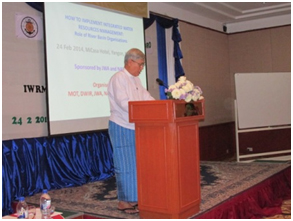 |
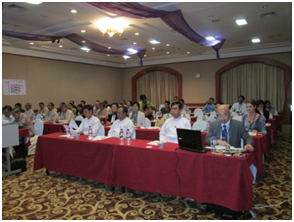 |
H.E. Mr. Han Sein, Deputy Minister of Transport |
Workshop at MiCaSa Hotel in Yangon |
Following the welcome speech by the Deputy Minister of MOT, Dr. Swe Swe Aye, Chairperson of ARBRO welcomed the participants and introduced the activities of ARBRO. Dr. Swe Swe Aye stressed the necessity of the concrete collaboration between related agencies for the future.
Mr. Shigeharu Jikan, Director General, Japan Water Agency also welcomed the participants on behalf of NARBO Secretary General and introduced the activities of NARBO and JWA. Mr. Jikan stressed that IWRM was improving step-by-step and made a commitment to keep supporting Myanmar through NARBO.
Following the opening session, Mr. Aye Myint, Member of the Expert Group of NWRC and former Director, Irrigation Department, Ministry of Agriculture and Irrigation and Mr. Satoshi Ojima, Deputy Director, JWA and NARBO introduced experience of IWRM in Myanmar and Japan as keynote lecturers. Mr. Aye Myint stressed the necessity of monitoring process, capacity building for monitoring indicator and comprehensive approach on IWRM. Mr. Aye Myint also mentioned that water allocation indicator should be implemented in IWRM in Myanmar. Mr. Satoshi Ojima talked about IWRM from the viewpoint of people’s happiness and explained how JWA experienced IWRM and developed engineering on IWRM in Japan. Mr. Ojima stressed the importance of ownership of the project and the necessity of identification of ‘What you want to do with support’. Mr. Ojima concluded his presentation with the keywords such as ‘Think globally, act locally’.
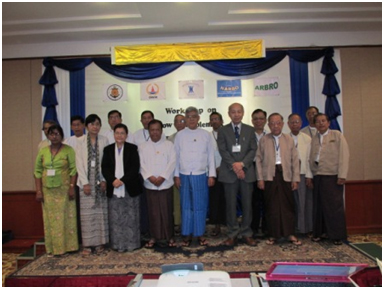 |
Group Photo |
Before lunch break. Mr. Satoshi Ojima and Mr. Tadashige Kawasaki, NARBO Secretariat explained how to implement IWRM by introducing NARBO activities and “Regional Capacity Development Technical Assistance (R-CDTA) 7547: Supporting Investment in Water Security in River Basins” by JWA and ADB. Mr. Ojima explained case studies of Indonesia and Nepal by focusing on the role of RBO and importance of the capacity development of RBOs. Mr. Kawasaki explained NARBO’s tools to implement IWRM such as ‘RBO Performance Benchmarking’ and ”IWRM Guidelines” and emphasized how these tools contributed to improve IWRM in Asia.
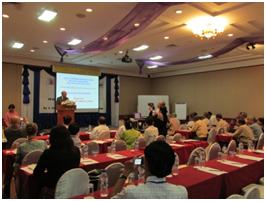 |
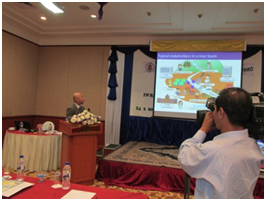 |
Opening Remarks |
Keynote Lecture |
In the afternoon session, 7 delegates from organizations in Myanmar and Japan were invited to the panel discussion. Mr. Kawasaki led the panel discussion as a moderator and made 3 questions to the panelists such as i) What is necessary to implement IWRM in Myanmar, ii) What is the expectation to RBO in implementation of IWRM in Myanmar, and iii) What is the expectation to international organizations to implement IWRM in Myanmar. Mr. Sein Tun, Director, DWIR, Ministry of Transport stressed the necessity of collection of current situation on IWRM and grasping existing baseline on IWRM implementation in Myanmar. In addition, Dr. Khin Ni Ni Thein, ARBRO Founder and Special Advisor, Secretary of the Expert Group of NWRC emphasized that there were many excellent human resources in Myanmar, however, they needed holistic policy to implement IWRM and lobbying support in addition to financial and technical support from international society. From the floor, there were comments for the necessity to implement IWRM and the establishment of RBO as well as the establishment and implementation of holistic policy by securing transparency, and intensive discussions were conducted.
As result of discussions, we agreed that we need i ) Clear target and process to implement IWRM, ii) establishment of active RBO and iii) Continuous support not only in financial area, but also in experience & engineering with ownership.
At the end of the workshop, Mr. Sein Tun, Director, DWIR, Ministry of Transport offered closing remarks as representative of MOT and talked about the expectation and the result of the workshop by introducing the NWRC and declared the success of the workshop.
Mass media, including Newspaper companies, reported the workshop through TV program and newspapers, and contributed to disseminate the concept of IWRM and raise awareness of the necessity of IWRM to the people in Myanmar.
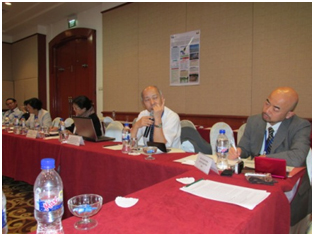 |
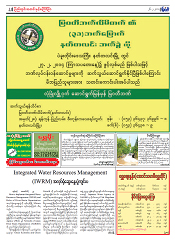 |
Panel Discussion |
Newspaper |
Way forward
The workshop identified some issues to implement IWRM related to the situation of water in Myanmar. Delegates from Myanmar touched on NARBO and JWA’s experiences on IWRM, especially how to implement IWRM and the role of RBO. We convinced the participants of Myanmar that the workshop was a very good opportunity to raise awareness of the importance of implementation of IWRM in Myanmar and show the effective and practical tools to implement it.
To maximize the achievement of this workshop, concreted actions to implement IWRM in Myanmar should be explored through continuous discussions and the establishment of concrete collaboration activities.
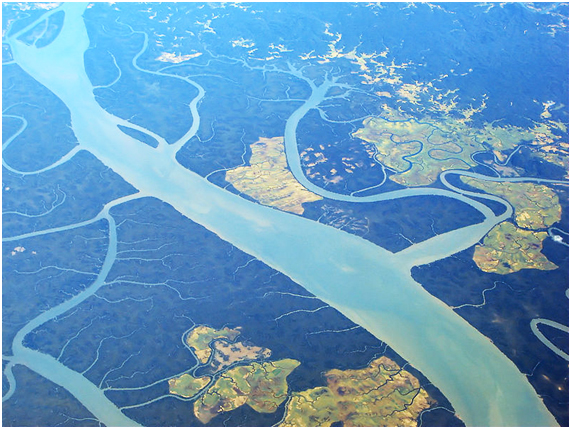 |
